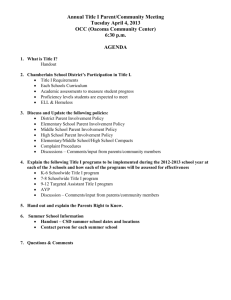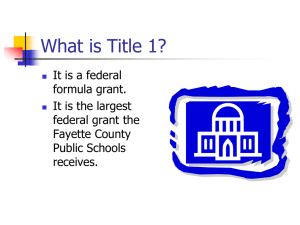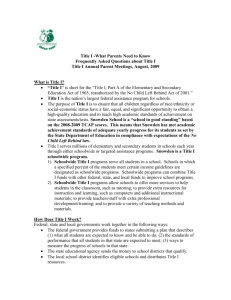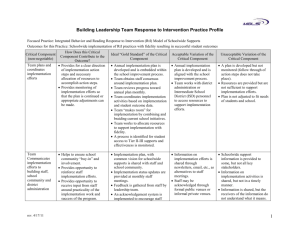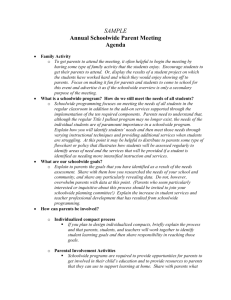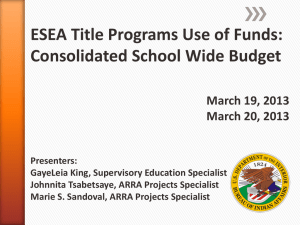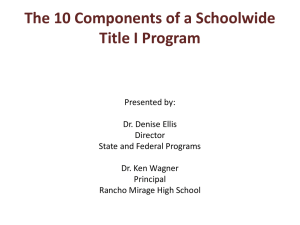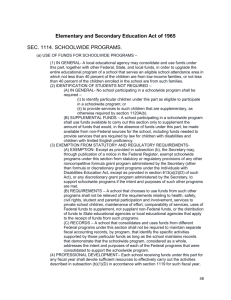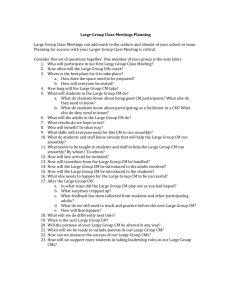2016-2017 Application of Intent to Operate a Title I Schoolwide
advertisement
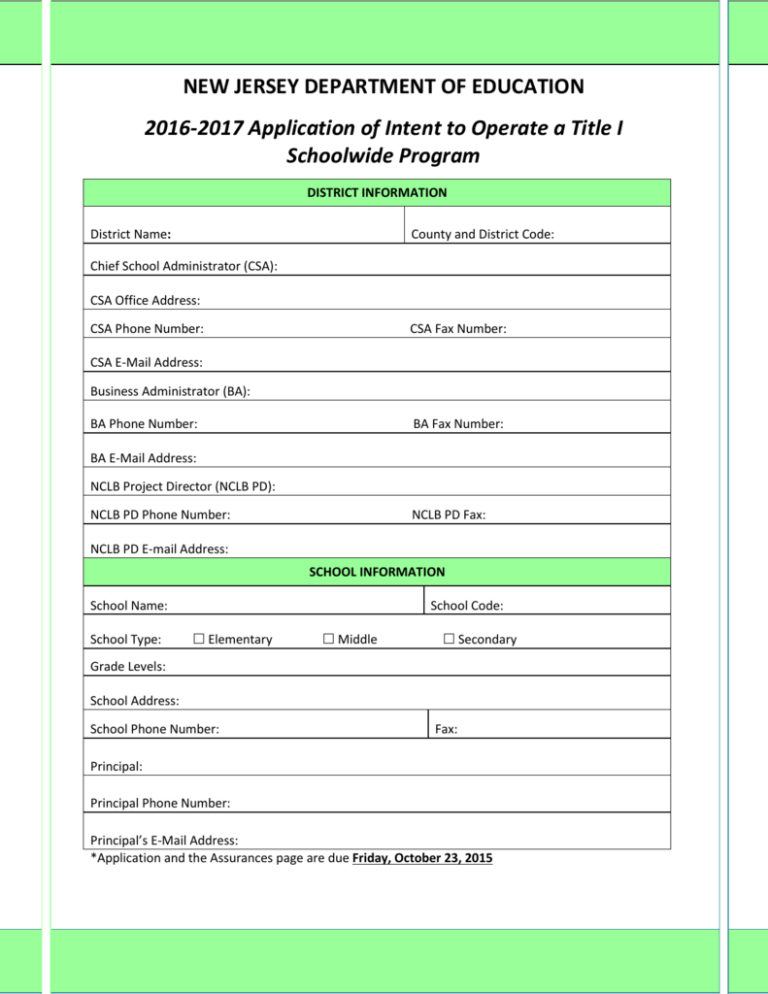
NEW JERSEY DEPARTMENT OF EDUCATION 2016-2017 Application of Intent to Operate a Title I Schoolwide Program DISTRICT INFORMATION District Name: County and District Code: Chief School Administrator (CSA): CSA Office Address: CSA Phone Number: CSA Fax Number: CSA E-Mail Address: Business Administrator (BA): BA Phone Number: BA Fax Number: BA E-Mail Address: NCLB Project Director (NCLB PD): NCLB PD Phone Number: NCLB PD Fax: NCLB PD E-mail Address: SCHOOL INFORMATION School Name: School Type: School Code: Elementary Middle Secondary Grade Levels: School Address: School Phone Number: Fax: Principal: Principal Phone Number: Principal’s E-Mail Address: *Application and the Assurances page are due Friday, October 23, 2015 2016-2017 Application of Intent to Operate a Title I Schoolwide Program The Elementary and Secondary Education Act (ESEA) non-regulatory guidance on Designing a Schoolwide Program defines Title I schoolwide programs as those schools that, “…use Title I funds to meet the needs of all students in the school, as determined through a comprehensive needs assessment. In a Title I schoolwide program multiple objective educationally related criteria are no longer needed in terms of identifying students to receive Title I services. Additionally, there are no distinctions made between staff paid with Title I funds and staff not paid with Title I funds. All school staff are expected to direct their efforts toward upgrading the entire educational program and improving the academic achievement of all students, particularly those who are low achieving.” The emphasis in a Title I schoolwide program is on serving all students, improving all structures that support student learning, and combining all resources, as deemed allowable, in order to bolster the academic achievement of all students attending a designated schoolwide school. When designed efficiently and effectively, schoolwide programs can maximize the impact of Title I funding. A schoolwide program is a comprehensive reform strategy designed to upgrade the entire educational program in a Title I school; its primary goal is to ensure that all students, particularly those who are low-achieving, demonstrate proficient and advanced levels of proficiency on State academic achievement standards. A comprehensive schoolwide reform strategy requires that a school – Conduct a Comprehensive Needs Assessment; Identify and commit to specific goals and strategies that address those needs; Create a comprehensive plan; and Conduct an annual review of the effectiveness of the schoolwide program and revise the plan as necessary. Adopting this strategy should result in an ongoing, comprehensive plan for school improvement that is owned by the entire school community and tailored to its unique needs. I. STATUTORY AND REGULATORY REQUIREMENTS THE SCHOOLWIDE PLANNING TEAM Composition: The first step in becoming a Title I schoolwide program is planning. Schools are to devise a team of stakeholders that is charged with conducting a Comprehensive Needs Assessment, facilitating the development of a shared vision, and identifying specific strategies to address the needs of the entire school community. The planning team must include members of each stakeholder group (i.e., teachers, parents not affiliated with the school, administrators, central office personnel, community members not affiliated with the school and, for secondary schools, the team should include students). A. MINIMUM POVERTY LEVEL: In accordance to ESEA §1114(a)(i) to be eligible to become a Title I Schoolwide program, at least 40 percent of the students in the school, or residing in the attendance area served by the school, must come from low-income families. [This requirement is waived for Priority and Focus Schools.] B. TITLE I SCHOOLWIDE PLAN: The plan must document that the school has met the statutory intent and purposes of a schoolwide program. Specifically, the plan must document the school’s efforts to complete the following: Identify reform strategies, aligned with the Comprehensive Needs Assessment, that are research-based, and provide opportunities for all children to meet the State’s proficient or advanced levels of academic achievement; 2 document1 2016-2017 Application of Intent to Operate a Title I Schoolwide Program Provide instruction by highly qualified teachers; Offer high-quality, ongoing professional development; Create strategies to attract highly qualified teachers; Create strategies to increase parental involvement; Develop plans to assist preschool students through the transition from early childhood programs to local elementary school programs; Identify measures to include teachers in decisions regarding the use of academic assessments; Conduct activities to ensure that students who experience difficulty attaining proficiency receive effective, timely, additional assistance; and Coordinate and integrate federal, state, and local services and programs. Please Note: The Title I Schoolwide Plans for Title I schoolwide schools that operate as non-categorized schools (i.e., ‘Reward’ and ‘Other’) must be completed and uploaded to the “School Application Folders,” located in the NJDOE Homeroom at: http://homeroom.state.nj.us/. All schoolwide plans must be uploaded in these folders, to coincide with the submission of the district’s ESEA-NCLB Consolidated Subgrant Application. Access to the “School Application Folders” in NJDOE Homeroom is limited to district-level administrators. As such, districts’ ESEA-NCLB project directors must upload the applicable schoolwide plan filed for the aforementioned non-categorized schoolwide schools as follows: Access the “School Application Folders” located in the NJDOE Homeroom at: http://homeroom.state.nj.us; Upon logon, user will be prompted to upload the schoolwide plan(s) using a specific naming convention (School Code_School Name_SWP); and Upload each PDF file using the naming convention specified above with a maximum file size of 15MB. To obtain the necessary permissions to access the NJDOE Homeroom, district administrators must contact the district’s Homeroom Administrator (typically, district’s technology coordinator). II. ACCOUNTING FOR SCHOOLWIDE FUNDS Unconsolidated Funds Accounting for schoolwide funds in an unconsolidated environment is similar to a targeted assistance program, except that districts should use location codes for funds for an individual school (since schoolwide is approved on a school level basis). To ensure proper use of Federal program funds, districts must maintain a record of expenditures using a unique program code for the schoolwide expenditures by function and object code (e.g., 20-XXX-XXX-XXX) and by school for purposes of the year-end financial reporting (CAFR). Also, it may be easier to compute and track the reimbursable amounts required under N.J.S.A. 18A:66-90 (TPAF/FICA Reimbursement Report) if you use separate accounting. Time and Activity reports also are required under an unconsolidated accounting system. Consolidation of Funds ESEA §1114 authorizes eligible schools to consolidate Title I funds, along with other federal, state, and local funds to operate schoolwide programs. The ability to consolidate funding is provided so that schools and districts can focus on designing the schoolwide program first before determining how the plan will be funded, rather than have funding determine the program design. 3 document1 2016-2017 Application of Intent to Operate a Title I Schoolwide Program If a school opts to consolidate its federal funds, the district will not have to maintain separate fiscal accounting records for each program. Accordingly, the schoolwide plan must clearly document that the school has met the statutory intent and purposes of Title I, Part A, as well as each federal program included in the consolidation. Certain Title I funds cannot be consolidated including the following: a. Required reserves for Parental Involvement; b. Funds generated for equitable services to eligible nonpublic students; and c. School improvement funds-1003(a) and (g). Certain other federal programs administered by the United States Department of Education (USDE) are limited in the amount of funds that can be consolidated in a schoolwide program. Districts should consult the July 2, 2004, Federal Register (Volume 69, Number 127), which can be found at: https://www.federalregister.gov/articles/2004/07/02/04-15121/notice-authorizingschoolwide-programs-to-consolidate-federal-education-funds-and-exempting-them for further guidance on schoolwide programs and blending. Note: Please remember that whether you consolidate funds, the school must run a program for each grant it receives. 4 document1 2016-2017 Application of Intent to Operate a Title I Schoolwide Program III. DIRECTIONS FOR SUBMISSION OF THE APPLICATION: Complete the Cover Page and the Assurances page (Page 5). Email the completed Cover Page and signed Assurances page to the Office of Supplemental Educational Programs at: schoolwide@doe.state.nj.us by Friday, October 23, 2015. IV. NEXT STEPS AFTER SUBMISSION: The district will receive an email from the Office of Supplemental Educational Programs confirming the receipt of its application of Intent to Operate a Title I Schoolwide Program. A minimum of two representatives from the district, as well as principals from the schools wishing to transition to schoolwide MUST attend a workshop in November 2015 for new schoolwide programs. The district will be required to submit supporting documentation of its Schoolwide Planning Team meetings and the Comprehensive Needs Assessment to the Office of Supplemental Educational Programs at: schoolwide@doe.state.nj.us. The Title I Schoolwide Plans for Title I schoolwide schools that operate as non-categorized schools (i.e., ‘Reward’ and ‘Other’) must be completed and uploaded to the “School Application Folders,” located in the NJDOE Homeroom at: http://homeroom.state.nj.us/. The schoolwide plan template is available for districts at: http://www.state.nj.us/education/title1/program/schoolwide.shtml. Note: Any portion of the ‘Intent to Operate a Title I Schoolwide Program’ missing or submitted incompletely automatically disqualifies a school to transition to a Title I Schoolwide program for the 2016-2017 school year. 5 document1 2016-2017 Application of Intent to Operate a Title I Schoolwide Program ASSURANCES The district assures the following for each of its schools that intends to begin the operation of a Title I schoolwide program in the 2016-2017 school year (place an next to each assurance): 1. Schoolwide Planning Team [ ESEA §1114(b)(2)] Composition: District assures each school has a Schoolwide Planning Team that is composed of members of each stakeholder group (i.e., teachers, parents not affiliated with the school, administrators, central office personnel, community members not affiliated with the school and, for secondary schools, the team should include students). Stakeholder Engagement: District assures it will submit documentation of at least four (4) Schoolwide Planning Team meetings prior to receiving approval to operate a Title I schoolwide program. Comprehensive Needs Assessment: District assures each school’s Schoolwide Planning Team will use the 2015-2016 school year to conduct a Comprehensive Needs Assessment to identify the unique needs of its stakeholders (i.e., students, staff, parents, etc.), and how all stakeholders will benefit from the implementation of a Title I schoolwide program. 2. Title I Schoolwide Plan [ ESEA §1114(b)(2)] District assures the school will complete and upload a Title I Schoolwide Plan and upload to the ‘School Application Folders’ in the NJDOE Homeroom, to coincide with submission of the district’s ESEA-NCLB Consolidated Subgrant Application. 3. Paraprofessionals [ESEA §1119(d): 34 CFR§200.58] District assures that in each school, paraprofessionals with any instructional duties have met one of the following requirements: Completed two years of study at an institution of higher education; Obtained an associate’s (or higher) degree; or Met a rigorous standard of quality and be able to demonstrate, through a formal State or local academic assessment, knowledge of, and the ability to assist in instructing, reading, writing, and mathematics (i.e. ETS Parapro Assessment). 4. Supplement Not Supplant [ESEA §1114(a)(2)B)] District assures that Title I funds will be used only to supplement the amount of funds that would, in the absence of the Title I funds, be made available from non-federal sources for each school operating a Title I schoolwide program, including funds needed to provide services that are required by law for children with disabilities and children with limited English proficiency. Tracking of Funds: District assures that it will track all state and local funds by location, and confirms that the school received _________% in State and Local Funding for 2015-2016. 5. Consolidation of Title I, Part A Funds [34CFR §200.29] Level of Funding: If Title I funds are consolidated, along with other federal, state, and local funds to operate schoolwide programs, the district assures that the percentage allocated to each school’s operating budget in subsequent years from each ESEA program must remain less than or equal to the funds allocated to the school operating budget in the initial year (2015-2016). Program Intent and Purpose: If Title I funds are consolidated, along with other federal, state, and local funds to operate schoolwide programs, the district assures that each school will meet the intent and purposes of the Title I, Part A program, and each federal program included in the consolidation. [ESEA §1114(b)(1)]. See: https://www.federalregister.gov/articles/2004/07/02/04-15121/notice-authorizingschoolwide-programs-to-consolidate-federal-education-funds-and-exempting-them Chief School Administrator’s Signature: ______________________________ Date: _______________________ Business Administrator’s Signature: _________________________________ Date: _______________________ NCLB Project Director’s Signature: ___________________________________ Date: _______________________ Principal’s Signature: ______________________________________________ Date: _______________________ 6 document1
